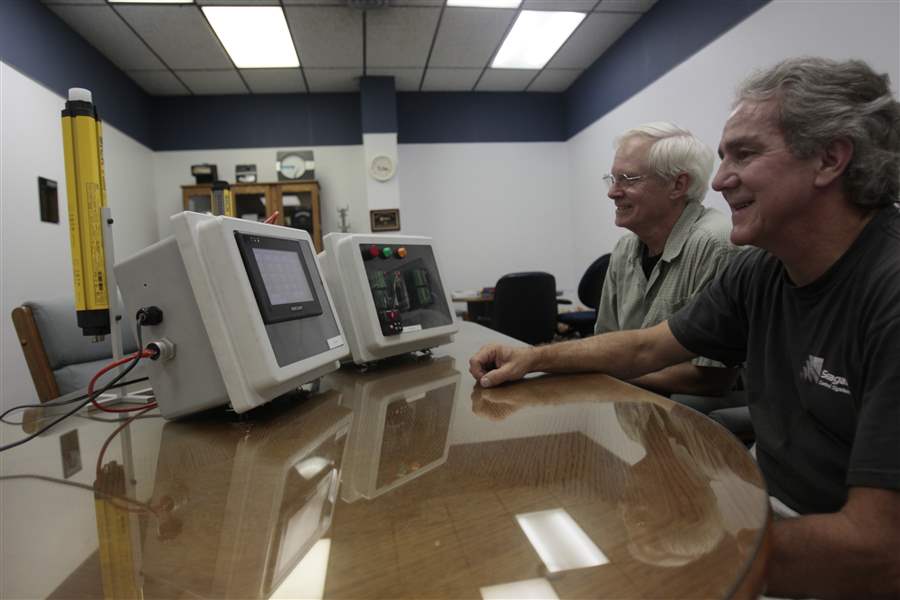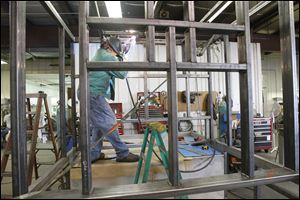
Recession hit area firms hard
Census figures show suffering exceeded that statewide, in U.S.
7/31/2011
Rob Nutter and Jim Schroeder Sr. look at a temperature control device at Seagate Control Systems.
The Blade/Lisa Bernheim
Buy This Image

Rob Nutter and Jim Schroeder Sr. look at a temperature control device at Seagate Control Systems.
Business is on the upswing at Seagate Control Systems Inc., a distributor of electrical control systems for manufacturing plants. But it was a different story a couple years ago for the Toledo firm.
Revenues decreased during the recent recession, and continued financial pressures led the firm to cut jobs last year. Since then, new customers have allowed Seagate to reach $3 million in sales, and laid-off staff members have returned.
Still, President Jim Schroeder, Sr., said it was a challenge for Seagate to weather the recent economic downturn.
"We saw it immediately as the recession began," he said. "Our sales fell by 30 or 40 percent. We were really struggling."
New figures from the U.S. Census Bureau show that metro Toledo had difficulty keeping businesses open and retaining jobs between 2007 and 2009 -- a period that provides a snapshot of the area before and just before the end of the recent recession.
In the four-county region -- Lucas, Wood, Fulton, and Ottawa counties -- the number of local companies declined 5 percent in that two-year period, slipping by 800 to 14,900 in 2009.
The number of employees in metro Toledo dropped by 9 percent, or 24,500, to 262,600 in 2009.
Local counties fared worse than the state as a whole in employment.

The number of companies in Ohio fell by 5 percent between 2007 and 2009, and the number of employees dropped 7 percent.
Nationally, the number of companies fell 4 percent and employment declined 5 percent.
The national recession started in December, 2007, and ended in June, 2009, according to the National Bureau of Economic Research. The county business and job figures reported by the Census Bureau were collected from federal reports in March of each year.
County by county, the business and job slump during that period was largely in the construction and manufacturing sectors, according to Census figures. Guhan Venkatu, an economist with the Federal Reserve Bank of Cleveland, noted that many of the losses were from automotive-industry cutbacks.
For instance, about 5,000 automotive workers at local plants, including General Motors Co.'s Toledo Powertrain plant and Chrysler Group LLC's Toledo Assembly complex, as well as Chrysler's Toledo Machining Plant in Perrysburg Township, were placed on extended layoff in December, 2008.
Most of them have since been called back to work.
Some manufacturing jobs are returning to northwest Ohio -- GM announced in May that it will invest $204 million and add 250 jobs in Toledo, and Chrysler has applied for state permits for a production increase at its Toledo Assembly complex. George Mokrzan, chief economist for Huntington Bancorp in Columbus, said northwest Ohio has had recent improvements in the economy, particularly in manufacturing and export-related fields.
"The recovery's not going at a quick rate, which has been disappointing," he said. "But it has been growing."

Paul DeLisle welds a wash system at Met-L-Tec in Temperance, a company that has cultivated customers outside its automotive base.
But the Fed's Mr. Venkatu said that advances in technology and automation make it unlikely that the local manufacturing sector will return to prerecession employment levels.
"The kind of investments that have been made in terms of auto plants are just the kind that require fewer workers," he said.
In Lucas County, employment fell by 8 percent, or 15,400 jobs, from 2007 to 2009. The number of companies dipped by 600. Hardest-hit industries were construction, which lost 12 percent of businesses and 35 percent of employees, and manufacturing, off 11 percent in firms and 22 percent in employees.
However, businesses in the educational services sector -- which includes private or nonprofit colleges, universities, and training centers -- grew by 6 percent, and employment increased by 11 percent.
The statistics do not include public school systems or public colleges and universities.
Despite the economic picture, Seagate Control Systems was able to rebound from the recession by using the Internet to seek new manufacturing clients outside the region. Mr. Schroeder said Seagate has become a stronger company.
"We have customers from Alaska to Mexico," he said. "It's worked out really well."
Other local counties experienced losses similar to those in Lucas County.
In Wood County, the number of companies fell 4 percent, or by 100, to 2,800 in 2009. Employment dropped 9 percent, or 4,400, to 47,600 in 2009. Construction companies fell by 13 percent despite a 9 percent increase in employees. Manufacturing firms declined by 7 percent and jobs dropped by 26 percent.

Other industries experienced smaller declines. For example, the numbers of retail, transportation, and professional services firms fell by 3 percent, 5 percent, and 8 percent, respectively.
Metric-X, an information technology firm in Perrysburg Township, did its part to keep local job numbers up.
The company, which has five employees, took the unusual step of teaming up with competitors as a survival strategy during the downturn.
The company shared some of its work with other IT firms that were losing business and otherwise planning to lay off employees, Saad Shah, the chief executive officer, said. The move allowed his firm to serve customers without hiring more staff.
Mr. Shah said it was often difficult for IT firms to acquire new accounts during the recession. In addition to partnerships, Metric-X boosted its marketing efforts during the downturn.
"The recession was a wake-up call for all of us that new business didn't just come in because we had a sign out on the front door," Mr. Shah said.
Fulton County had some of the largest declines in the metro Toledo region between 2007 and 2009. According to Census data, the county had a 6 percent dip in the number of companies and a 20 percent, or 3,800, plunge in employment. The biggest job loss -- 33 percent, or 3,300 -- was in manufacturing. Construction and professional services industries also took significant hits.
Ottawa County had an 8 percent decrease in businesses and in jobs during the two-year period. Besides losses in the construction sector, the county had notable decreases in transportation and warehousing jobs.
Even in northwest Ohio's Hancock County, jobs fell by 7 percent and the number of firms dropped by 4 percent from 2007 to 2009, the Census figures show. The county, of which Findlay is the county seat, traditionally has one of the lowest unemployment rates in the state.
The recession also took a hard toll north of Toledo in Michigan.
The number of businesses and employment in Monroe County fell by 6 percent from 2007 to 2009. That's compared with a 6 percent loss in companies and an 8 percent decline in employment across Michigan during the period.
Jeff Schmitz, president of Met-L-Tec LLC in Temperance, said his company was among the firms that would have faced pressure from the recession. He and two other investors bought the metal fabrication business last year after the previous owner struggled because of losses of automotive-industry sales.
"They had some cutbacks, and they had not replaced anybody," he said, referring to layoffs.
The company's new owners have worked to market Met-L-Tec to new clients and increase the company's visibility on the Internet. The strategy has paid off so far -- sales are up by about 100 percent, and the company has hired a half dozen employees since 2009, Mr. Schmitz said. He said the company, which has 18 employees, will hire one or two more in the next six months.
Mr. Schmitz is upbeat about Met-L-Tec's post-recession prospects.
"At this point, things are looking fairly well," he said.
Contact Sheena Harrison at: sharrison@theblade.com or 419-724-6103.